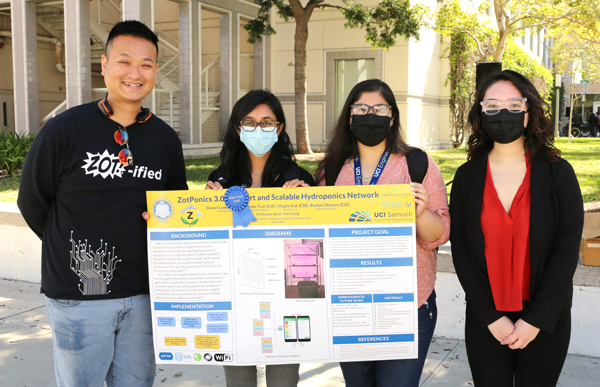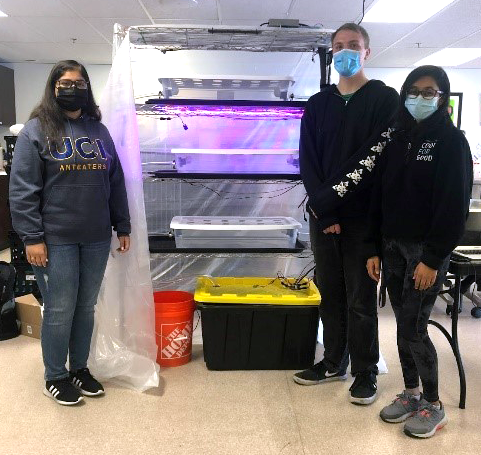ZotPonics Team Working to Bring Sustainable Gardening to UCI

Quoc-Viet Dang, assistant professor of teaching, stands proudly with the ZotPonics 3.0: A Smart and Scalable Hydroponics Network team at the 2022 Winter Design Review, where the team earned a Dean’s Choice Award. Pictured with Dang, from left, are Rashmi Sharma, Megha Kak and Melinda Tran. Debbie Morales
May 31, 2022 - The future of farming may eliminate the need for soil. Hydroponics – growing plants in a nutrient-rich liquid rather than in the ground – is one of the innovative solutions challenging traditional methods of farming and gardening. For the past three years, a UC Irvine engineering student team has been designing an indoor hydroponics system that could be used to grow fresh produce for the campus food pantry.
ZotPonics 3.0: A Smart and Scalable Hydroponics Network is one of the engineering senior design projects that was featured at the 2022 Winter Design Review and a recipient of the Dean’s Choice Award. Computer science and engineering majors Daniel Lowe, Melinda Tran, Megha Kak and Rashmi Sharma worked on the team under the guidance of faculty mentor Quoc-Viet Dang, assistant professor of teaching in electrical engineering and computer science.
The full ZotPonics system includes a vertical rack holding several plant basins on shelves with tubes connected to a water reservoir that provides plants with the nutrients they need to grow. The system also employs wireless technology for a hands-off experience for users.

A few of the ZotPonics team members installing the system at the UCI FRESH Basic Needs Hub, from left are Megha Kak, Daniel Lowe and Rashmi Sharma. Megha Kak.
The idea of hydroponics is not new, but what differentiates ZotPonics from other commercially available systems is its mobile application. With the app, which was developed by Kak and Sharma, users can remotely monitor and adjust watering frequency, humidity level, temperature, the grow-lights schedule and even share the status of the hydroponic system on social media.
The students gained valuable hands-on engineering experience while developing the project, particularly in working on code and building the shelves for the physical system. There was also a large amount of testing involved, from testing the hardware design to connecting the app to the physical system and ensuring the two worked together as intended.
One of the largest challenges the team faced was when the Raspberry Pi, the tiny computer used in the system, got infected with a virus due to being connected to the UCI campus internet. The team went through tutorials on how to remove the virus securely and reconfigured the Raspberry Pi to be its own hotspot so they’d no longer have to connect to an additional internet source, preventing the issue from happening again.
“It was a good learning experience though, and we did end up creating more documentation on what we did so that future teams would have less trouble getting started,” said Tran.
The project first materialized back in 2020 when students from the Department of Electrical Engineering and Computer Science approached Dang with an idea for their senior capstone project. They wanted to apply their passion for sustainability toward a project to demonstrate what they’ve learned as EECS majors.
Dang has overseen graduating seniors train incoming seniors to continue their progress throughout the multiyear project. “The students have continually inspired and impressed me each year. It is primarily student recruited, trained and improved upon each year. We have gone from a simple prototype to a wirelessly connected multi-shelf system in just three years,” said Dang.
A working prototype is installed at the UCI FRESH Basic Needs Hub, though it’s not operational yet.
“We hope to be providing students with the first batch of our own ZotPonics-grown vegetables within the next six months,” said Dang “The original team had envisioned having a student-run hydroponics vegetable garden at the UCI dorms, as well as local co-ops, to provide fresh veggies on demand while educating the users about sustainability and urban farming.”
The team is currently recruiting for the fourth year of the project, which will focus on further prototype development and analysis of the existing system. There will be opportunities for hands-on experience, even for students outside of EECS majors. Those who are interested in getting involved are encouraged to reach out to Dang directly.
– Yuika Yoshida
